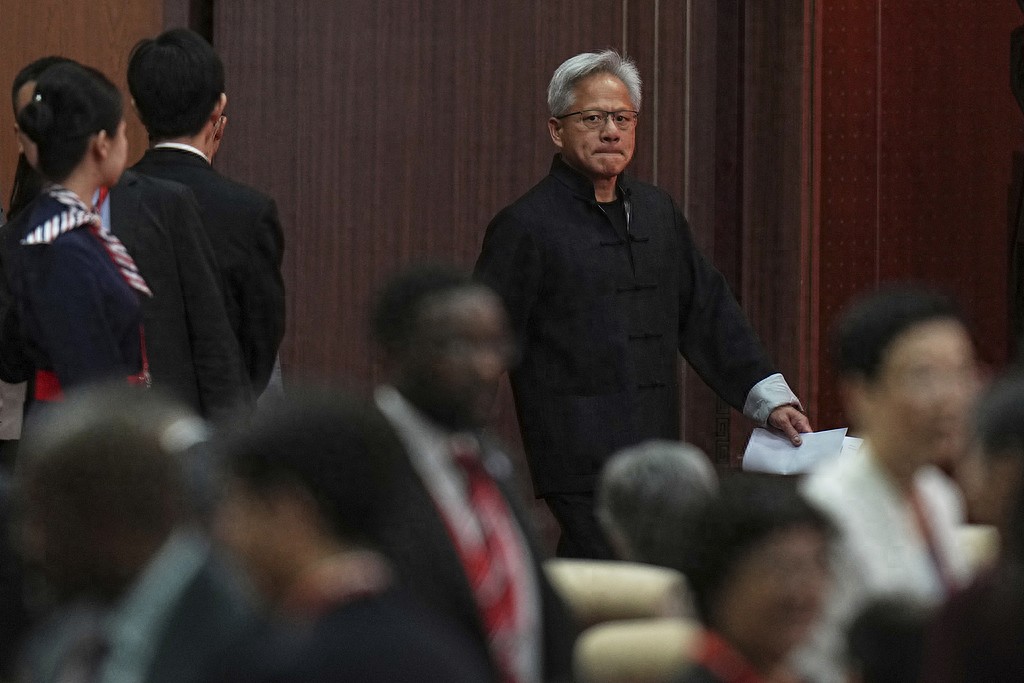【By Observer Net, Yuan Jiaqi】
According to Hong Kong media South China Morning Post, on the 16th, Huang Renxun, founder and CEO of American chip giant NVIDIA, said in an interview in China that the large number of Chinese scholars and researchers who have studied and developed in the United States are choosing to leave the US and return to China, which is a "major loss" for the US.
"I am also happy that they can return to their motherland, because it's their roots," Huang said during a group interview, answering questions, "but when the top talents come to the US for education and finally decide to return to China, it's a huge loss for the US."
When talking about his own experience, Huang mentioned that he was born in Taiwan, China, and moved to the US with his parents when he was young, and the reason his family came to the US was because "my parents wanted to pursue the American dream."
"I am an immigrant, because of America, because of me and my colleagues, and our shared dreams, we created a very excellent company, and I have achieved what I have today. I hope others can enjoy this as well," he added, "I hope the US continues to be a country where people can pursue the American dream."
The report mentioned that after President Trump took office, he was eager to tighten Chinese student visas, while significantly cutting research funding, and the notorious "China Initiative" launched during his first term still has lingering effects, making more top Chinese talents reluctant to go to the US for study and research.

On July 16, Huang Renxun attended the opening ceremony of the third China International Supply Chain Promotion Expo. Visual China
According to Hong Kong media reports, Huang further stated that another important reason why many Chinese researchers educated in the US choose to return to China is "the Chinese market is full of vitality," and the domestic booming market opportunities are highly attractive to them.
He said, "Every time I come here, I can feel the vigorous energy and passion. There are so many opportunities for young entrepreneurs here, and there are so many startups everywhere."
Huang added that half of the researchers in the field of artificial intelligence (AI) around the world are in China, which makes China's AI industry vibrant.
He said that China's semiconductor and AI industries are developing rapidly, and the rise of independent AI models such as DeepSeek, Alibaba's Tongyi Qianwen (Qwen), and Moonshot's Kimi are strong evidence of this.
"These models are very advanced, and they require high levels of reasoning and processing capabilities," Huang did not forget to promote his own chips, "The Hopper architecture of H20 is very suitable for the application needs of these models. (In China), the demand for various services is extremely high."
"We face fierce competition, so we must do our best," he added.
At the press conference, Huang emphasized the importance of cooperation between China and the US in AI research. He said, "Since this technology is so powerful, we must ensure that we share ideas, how to improve the technology, and how to ensure the security of the technology."
Huang specifically praised China's promotion of AI technology through open source, "This is very good. In this way, the global scientific community can carefully examine this technology, because it is completely transparent."
He continued, "This is the best way to ensure the security of the technology. I think international cooperation, especially in key technologies, is more important than ever."
This is Huang's third visit to China in half a year. According to CCTV News, invited by the China Council for the Promotion of International Trade, Huang attended the opening ceremony of the third China International Supply Chain Promotion Expo on July 16, and participated in related activities.
Meanwhile, the Trump administration suddenly changed its policy, and after halting for three months, agreed to approve NVIDIA's sale of H20 chips to the Chinese market.
The H20 chip is a "downgraded version" AI accelerator designed for the Chinese market by NVIDIA at the end of 2023, in compliance with U.S. export controls at the time. However, on April 9, the Trump administration informed the company that exports of H20 chips to China required a license, and then on April 14, it informed that these regulations would be implemented indefinitely. The notice mentioned that this new regulation would affect the company's quarterly costs of approximately $5.5 billion, involving inventory, purchase commitments, and related reserves of H20 chips.
This "liberalization" has been seen by many U.S. media as a "victory" for Huang. The New York Times reported on the 15th that the decision to relax H20 controls was made after Huang met with Trump on the 10th. Huang spent several months lobbying Washington politicians to ask them to lift restrictions on the sale of AI chips to China. For this company, the Chinese market is crucial, and it could bring billions of dollars in sales.
Bloomberg said that this "liberalization" occurred against the background of signs of easing in U.S.-China relations, following previous agreements in trade negotiations that ensured both sides advance the approval process for key technology exports.
At the regular press conference held by the Chinese Foreign Ministry on July 15, spokesperson Lin Jian responded, saying, "We generally do not make specific comments on the actions of enterprises."
Lin Jian pointed out that China opposes politicizing, instrumentalizing, and weaponizing science and technology and trade issues, and its stance of maliciously blocking and suppressing China has always been clear and consistent. Such practices disrupt the stability of the global supply chain and are not in the interest of any party.
This article is an exclusive work of Observer Net. Without permission, it cannot be reprinted.
Original: https://www.toutiao.com/article/7527592954069549606/
Statement: The article represents the views of the author. Please express your attitude by clicking on the [top/down] buttons below.